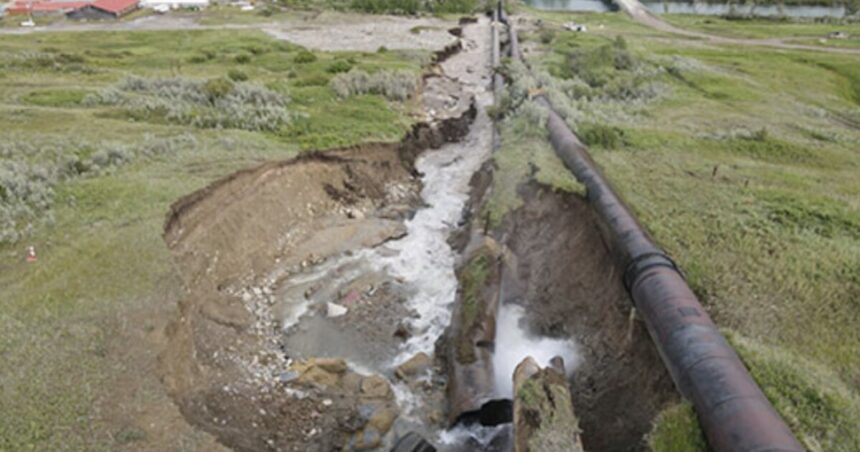With late-season irrigation now under threat along the Hi-Line after the failure of the St. Mary Canal earlier this week, the U.S. Senate voted Thursday to pass a long-awaited water compact settlement with the Fort Belknap Indian Community that includes $275 million to rehabilitate the canal as part of the Milk River Project.
The Senate voted by unanimous consent to pass the Fort Belknap Indian Community Water Rights Settlement Act, a $1.3 billion infrastructure and economic development package that has been under negotiation for years.
It is the final Indian water rights settlement in Montana, according to U.S. Sens. Jon Tester and Steve Daines. But it will still need to pass the House and be signed into law in order to take effect, reports the Daily Montanan.
The Milk River Project irrigates about 121,000 acres of land along 165 miles of the river from Havre to near Nashua and provides drinking water to about 18,000 people, according to the U.S. Bureau of Reclamation. The failure of the siphoning pipes at the St. Mary Canal on Monday means the project cannot pull water out of the St. Mary River at that point and send it into the Milk River.
After Montana’s political leaders called for quick action this week to try to fix the canal and project, Tester took to the floor Thursday to urge passage of the water settlement that includes more funding to rehabilitate the 111-year-old canal.
“It is a vital source of water for north-central Montana water users and to so many farmers that feed the world. The timing of this could not be worse, because there are literally hundreds of farmers and ranchers who are currently depending on the Milk River Project to irrigate their crops,” Tester said. “…Congress can unlock critical funding for the Milk River Project once again by passing the Fort Belknap Indian Community Water Rights Settlement.”
The St. Mary Canal provides between 60% and 80% of the water supply to users along the Milk River Project’s stretch depending on the water supply each year. The Bureau of Reclamation said Thursday it will continue to send water from Fresno and Nelson reservoirs until there are 27,000 acre-feet left in the reservoir and will move to holding water to meet municipal water and tribal storage needs.
“Impacts from this failure will be numerous and wide ranging, and we will be working closely with our partners to do everything in our power to minimize impacts,” said Bureau of Reclamation Montana Area Office Manager Ryan Newman.
The Bureau of Reclamation told the Associated Press earlier this week that design work to replace the pipes that failed had already been underway since last year and were 60% complete. A 2023 Bureau of Reclamation report considering the impacts of replacing the diversion dam at St. Mary Canal found failures of the dam or headgates could lead to a potential “catastrophic” situation that “could result in an economic disaster for north-central Montana.”
The Fort Belknap Indian Community Water Compact was ratified between the tribes, State of Montana and feds in 2001. The Fort Belknap Indian Community has been trying to get the settlement approved in Congress since 2012. Along with sending funding toward the Milk River project, the settlement restores management of 38,000 acres of federal and state land to the Fort Belknap tribes and provides hundreds of millions of dollars for irrigation on the reservation.
“This bill will help provide clean drinking water to Montanans on the Hi-Line, invest in critical ag irrigation and help prevent costly litigation by codifying existing water rights,” Daines said in a statement. “Especially after the catastrophic siphon failure at St. Mary’s this week, we must get this done. After years of hard work with the Fort Belknap Indian Community and local leaders on the ground, I’m glad to see this come one step closer to becoming law.”
Daines and Tester had placed the settlement into the Senate-passed version of the National Defense Authorization Act last summer, but it was stripped out of the House-passed version.
On the Senate floor Thursday, Tester pressed the Republican-led House to take up the bill imminently before the Senate passed it by unanimous consent.
“The House needs to put aside politics and pass this bill. Farmers’ operations that have been generational in this region’s livelihood are on the line. Water for municipalities is on the line. This is no time to play politics,” Tester said. “…The Senate will do its job. It’s time for the House to act responsibly too. So let’s get this done. We can repair the Milk River Project and give water users in north-central Montana the certainty and predictability they need to survive.”
Rep. Ryan Zinke, R-Montana, introduced a Fort Belknap water rights settlement bill similar to Tester’s and Daines’ bill earlier this week, so if the House decides to take up his bill or the Senate version, there is a chance the measure could soon be headed to President Joe Biden’s desk. Rep. Matt Rosendale, R-Montana, supported the compact settlement last year.
“Just this week another siphon on the St. Mary Canal blew out. The canal provides critical water resources to our reservation and surrounding communities,” Fort Belknap Indian Community Jeff Stiffarm said in a statement. “Congressional passage of our bill will finally protect our water rights and provide the funding we all need to secure our future for generations to come.”
Tester said earlier this month an $88 million contract was awarded to a construction company to finish the St. Mary Diversion Dam Replacement project that is part of the Infrastructure Investment and Jobs Act pool of money.
He also wrote to the secretaries of the Department of Interior and Department of Agriculture this week saying the departments needed to put their full attention toward the canal failure. Tester additionally sent a letter to President Biden asking him to consider including money for repairs in a domestic spending package the White House is preparing to send to Congress.
“Addressing the damage caused by the floods and rebuilding this critical infrastructure will require support from Congress. The cost will be far too great for the local communities to meet the current cost-share requirements,” Tester said to Biden. “Furthermore, this will not be a simple project to design and construct. As such, it is critically important that resources are made available to begin this process without delay.”
Gov. Greg Gianforte in a statement lauded the Senate passage of the water rights settlement.
“This settlement reflects the culmination of nearly a half-century of dedicated work,” he said. “This historic bill is a win for our state and the Fort Belknap Indian Community.”





